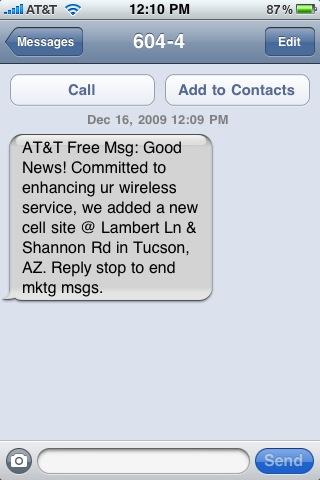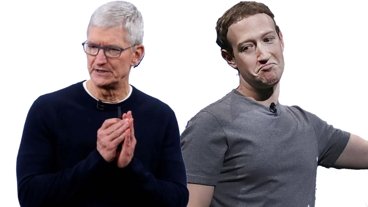As recently as this week, AT&T has been sending marketing text messages to its customers, notifying them when new cellular towers are installed in an area to boost reception. The company has been attempting to combat months of bad publicity that has centered on criticism of its network's performance since the launch of the iPhone 3GS.
But as AT&T has touted itself as having the fastest 3G network in America, executives with the company have also warned that mobile data hogs could have a higher monthly bill at some point in the future. The carrier has said that 40 percent of its network capacity is used by just 3 percent of smartphone users.
AT&T's perceived "threats" towards bandwidth-heavy users inspired Dan Lyons, under the guise of his comedic Fake Steve Jobs persona, to promote an "attack" on the AT&T network this week. Dubbed "Operation Chokehold," the coordinated effort suggested by Lyons asked users to run bandwidth intensive applications on their phone at a specific time, in order to "overwhelm the AT&T data network and bring it to its knees."
The story gained some traction this week, and resurfaced once again days later after AT&T officials publicly commented on Lyons' satirical blog post. In an official comment to Cult of Mac, an AT&T spokesperson said:
"We understand that fakesteve.net is primarily a satirical forum, but there is nothing amusing about advocating that customers attempt to deliberately degrade service on a network that provides critical communications services for more than 80 million customers. We know that the vast majority of customers will see this action for what it is: an irresponsible and pointless scheme to draw attention to a blog."
Since AT&T made its public response, the number of Facebook fans for "Operation Chokehold" has grown significantly, from about 300 on Tuesday to more than 1,700 Wednesday afternoon.
The episode is another example of an item of bad publicity for AT&T steadily gaining traction. The wireless carrier has fought back in recent months with its own aggressive public relations campaign to convince its customers that it is working to improve its network. As Verizon eventually began lampooning AT&T with its "There's a map for that" ads, AT&T hired actor Luke Wilson to "set the record straight" on its network coverage.
This year AT&T said it will have invested between $17 billion and $18 billion in its wired and wireless networks. Among those upgrades are new cell towers intended to boost reception. Further down the road, the carrier expects to have its high-speed HSPA 7.2 upgrade completed in 2011.
One noteworthy exception to the bad publicity came on Saturday, when an article in The New York Times attempted to state that the iPhone hardware itself is the cause of dropped calls and spotty reception. AT&T is afraid to criticize Apple, author Randall Stross argued, so the company remains silent. However, the article was widely criticized for quoting the president of a network testing service that is a client of AT&T.
AT&T's recent tough talk on bandwidth use was portrayed last week as an attempt by the carrier to regain control of its wireless customers. iSuppli Corp said that services like iTunes and the App Store and their connectivity with the iPhone have made customers more tied to Apple than AT&T. Wireless carriers would like to regain that control from their subscribers, the analysis said.
 Neil Hughes
Neil Hughes







-m.jpg)






 Christine McKee
Christine McKee
 Wesley Hilliard
Wesley Hilliard
 Malcolm Owen
Malcolm Owen
 Andrew Orr
Andrew Orr
 William Gallagher
William Gallagher
 Sponsored Content
Sponsored Content








90 Comments
Anybody using their cell phone on AT&T's network during that hour will be declared a domestic terrorist and prosecuted as such...
Won't this be an inconvenience to others who just doesn't care?
...the number of Facebook fans for "Operation Chokehold" has grown significantly, from about 300 on Tuesday to more than 1,700 Wednesday afternoon.
...
Yeah, but people who want to post to call the effort juvenile and selfish ALSO have to join the facebook page and are counted among that 1700.
I think there are more mature users in our community than the handful who do stunts like this (it reminds me of college students at a small school in ohio who thought it was funny to flush their toilets in sync, and did great damage to the community's sewer system; fakesteve's written some funny stuff, sometimes even insightful stuff, but this idea belongs in the crapper)
Besides--relative to ATT's plan to "incentivate" users to moderate their usage--why SHOULD i care if 3% of users, who are responsible for 40% of network traffic, pay a premium? If i watch six movies today at the local cineplex i pay more than someone who goes in and watches just one: If several dozen like-minded people tie up all the seats in those six theaters they prevent hundreds of others from enjoying a single movie. If i drive 750 miles around my town I pay more than the person who cruises only once to the convenience store, and if dozens of others are putting on miles like I am, we congest the city's streets and maybe prevent you, and you, from even getting to the convenience store. If i print 400 pages out of my all-in-one my paper and ink costs will exceed the costs of someone who prints a single sheet; it costs me more to build a 4000 sf home than a 2100 sf one; I pay more if I want to cool my house to 55 degrees F in the summer than someone who's happy at 72 degrees, and if thousands of others utilize that resource in the greedy, 55 degree way, they contribute to brownouts that could end up with some people not being able to use their a/c at all. Should someone be allowed to book 95% of the rooms in a hotel at a city i want to visit--and pay the same as i'd pay for a single room? AND in the process prevent me and hundreds of other people from enjoying accommodations at our destination? If there are 40 cabanas on the beach in st pete, should two people be allowed to occupy all of them for the price of a single cabana, and keep 38 people from also enjoying that amenity? Or in all these instances should those consuming more pay more?
I could go on too long (ok, maybe i already did). But i don't get it. If i'm lucky enough to have business or personal needs that i meet by using ATTs service so extensively that i join that 3% of over-consumers, I should be happy to pay for that privilege. And I shouldn't talk about knocking down everyone else's cabanas and unplugging their printers, just because I'm unhappy because i can't everything i want for the price i want. Fakesteve and his cohorts deserve a bums rush on this one.
Honestly, with any statistical analysis, the top X% are always going to use more bandwidth than the other (100-X)% since not everyone uses the same amount, which means you can fiddle the numbers all you want to get what you need. Might I remind you that if everyone were to cut their bandwidth usage in 1/2, the statement would STILL be true, showing how stupid it is entirely. Rather, they want to selectively punish those at the top while not affecting those at the bottom (since they use far less than their fair share but pay the same).
I only have anecdotal evidence, but it does seem everytime I'm at a large gathering (concert, football game, etc), my iPhone, running on AT&T 3G, has a really hard time maintaining a data connection, while my friends' AT&T Blackberry's pull up Facebook, and email photos, etc just fine.